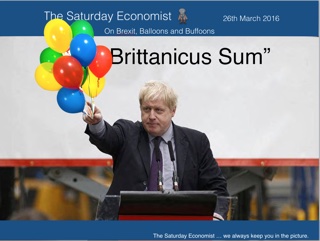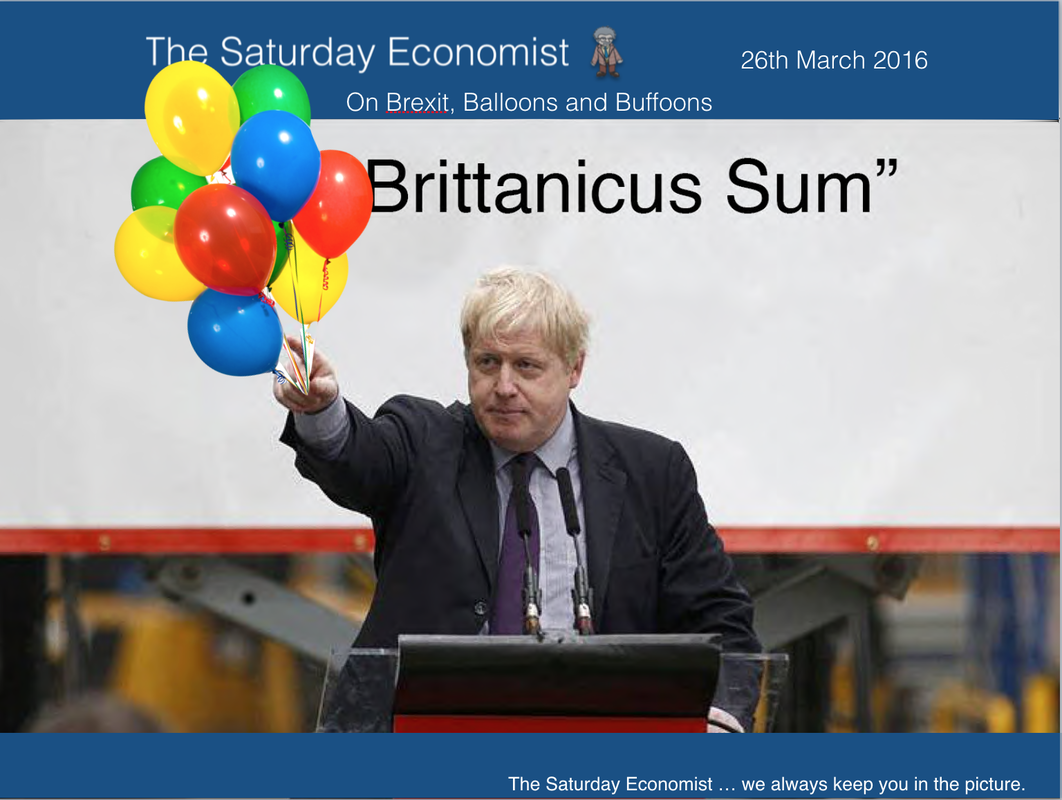 Shocking news emerged this week of the state of patriarchic top down regulation in the EU. Boris Johnson was in front of the Treasury Select Committee to be interrogated by Andrew Tyrie. During the session The Mayor of London revealed that no one over the age of eight was allowed to blow up a balloon in the Johnson household. The truth emerged during a question from the Chairman of the committee. Boris Johnson had claimed there were EU rules restricting the recycling of tea bags and banning children under the age of eight from blowing up balloons. Of course, there are no such restrictions. The EU has recommended that children under eight should be supervised when blowing up balloons to prevent swallowing and choking. Advisory guidance should be included on all relevant packaging the suggestion. There is no ban on blowing up balloons or tea bags for that matter! Boris had made the claim at a speech in Deptford last week, adding why should the EU determine the size of road traffic containers we build in the UK? Fair point. It’s so the containers can be driven around Europe without getting stuck in tunnels and avoiding crashing into bridges. A single market with a level playing field and roads free from road traffic disasters, all part of the European grand plan. Headlines and soundbites to not make for a sound “Leave” of “Remain” campaign for that matter. The Public look to senior politicians for information and advice on this important issue. The information must have a high degree of authority and intellectual honesty. This will not be delivered by blonde buffoonery. There should be an EU regulation about that … Brexit ... This week, we concluded our extensive research on the referendum question. It had arisen at the request of Marketing Stockport. Gold members of the Stockport group were confused about the issues and wanted an objective presentation about the key facts and figures. Some eighty slides were included in the presentation. [The vote was 85% in favour of “Remain” before the presentation was made.] A few undecided were later convinced to stay. We do not formally campaign for either camp. However from the research it is best to segment the arguments into four issues. The Business Case, The Economics Case, The Political Case and the Social Case. The latter is largely about immigration, the political case largely about sovereignty. The economics case is always finally balanced with well argued analysis from either camp. On the one hand … On the other hand, it is difficult to argue the business case to “Leave” the EU. Uncertainty is a drain on investment on the short term and in the medium term. We have no idea of the new world order which accounts for almost half of UK trade, 12% of GDP and 3.5 million jobs. The impact on aerospace and transport manufacturing could be significant. The “Leave” camp suggest it will be possible to secure a free trade agreement for goods, services and capital, without payment into the club, avoiding labour and product regulation in the process. Good luck with that. It is an impossible ask. Quad Erat Demonstrandum as some might say … We are hosting a series of events in the run up to the vote. The presentation to Marketing Stockport, discussions with our private equity group in Manchester, Sir Richard Leese arguing the “Remain” case and John Longworth ex Director General of the BCC will be with us at an additional event arguing the “Leave” case. More events are planned in the pro-manchester calendar over the next few months. Back in the UK … Inflation remained at 0.3% in February. Service sector inflation was 2.4% (that’s above target). Retail sales were up 3.8% year on year and government borrowing looks set to overshoot in the year to date by around £5 billion. £77 billion would appear to be the forecast outcome compared to the OBR forecast of £72 billion in the latest update and £92 billion last year … So what of rates … In the US the latest GDP revisions suggest growth was stronger across the board but with no revision to the 2.4% out turn for 2014. We expect growth in the US of 2.4% this year with a further two rises in interest rates before the end of the year. Sterling rallied against the Dollar rising to $1.48 by the end of the week from the February over sold position. We expect UK rates to rise in the third quarter this year as inflation accelerates and commodity prices rally. The MPC will be obliged to follow the Fed at some stage … So what happened to Sterling? Sterling closed up against the Dollar at $1.480 from $1.449 and down against the Euro at €1.265 from €1.285. The Euro moved down against the Dollar to €1.116 from €1.127. Oil Price Brent Crude closed at $40.45 from $41.12 The average price in March last year was $59.58. The deflationary impact continues but will begin to unwind later this year. Markets, held - The Dow closed at 17,515 from 17,554. The FTSE closed at 6,106 from 6,189. Gilts - yields moved up and down. UK Ten year gilt yields were up at 1.48 from 1.449. US Treasury yields moved up to 1.90 from 1.87. Gold closed at $1,265 ($1,251). The old relic glitters briefly. That's all for this week. Don't miss Our What the Papers Say, morning review! Follow @jkaonline or download The Saturday Economist App! Our review of the Brexit facts and figures out soon! John © 2016 The Saturday Economist by John Ashcroft and Company : Economics, Corporate Strategy and Social Media ... Experience worth sharing. The material is based upon information which we consider to be reliable but we do not represent that it is accurate or complete and it should not be relied upon as such. We accept no liability for errors, or omissions of opinion or fact. In particular, no reliance should be placed on the comments on trends in financial markets. The receipt of this email should not be construed as the giving of investment advice.
0 Comments
Leave a Reply. |
The Saturday EconomistAuthorJohn Ashcroft publishes the Saturday Economist. Join the mailing list for updates on the UK and World Economy. Archives
July 2024
Categories
All
|
| The Saturday Economist |
The material is based upon information which we consider to be reliable but we do not represent that it is accurate or complete and it should not be relied upon as such. We accept no liability for errors, or omissions of opinion or fact. In particular, no reliance should be placed on the comments on trends in financial markets. The presentation should not be construed as the giving of investment advice.
|
The Saturday Economist, weekly updates on the UK economy.
Sign Up Now! Stay Up To Date! | Privacy Policy | Terms and Conditions | |

 RSS Feed
RSS Feed